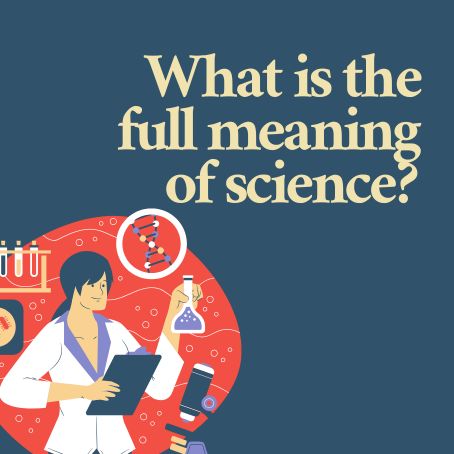The Full Meaning of Science
An impression of science could include consisting of laboratories, test tubes, and researchers wearing white coats. Although those stereotypes are limited imagery, the entailment of science is much broader and intricate. Science is an organized activity that constructs and organizes the world in the form of explanations and predictions that can be tested. In Latin, it is derived from the word scientia which means knowledge, hence from the meaning we can understand that science is the effort of human civilization to fathom the natural world. This paper in totality reveals the diverse meaning of science, its methods, relevance, and the role it plays in society, with an estimated word count of a thousand words.
The Definition of Science
When a person asks, what is this?, they have a scientific thought process, and all of this can be summarised as science. That is the basic principle of having a science, or rather looking for answers. Science is trying to uncover the understanding of the physical, biological and social world through observing, experimenting, and reasoning with well-toward objectives. The three objectives include empirical evidence, objectivity, and reproducibility which stand out. It can simply be rounded up to be about answering questions such as asking what is going on, coming up with a hypothesis, and testing it through various experiments for concluding.
The Branches of Science
In a general sense, science can be categorized into three areas of scholarly interest.
Natural Science: The categories in this area include physics, chemistry, biology, and earth sciences that study natural phenomena. As an example, physics seeks to understand how physical objects move and how they behave with energy whilst biology is concerned with the multitude of living organisms and their interactions.
Social Science: This category closely scrutinizes human behaviour, actions, and existing societal structures. Sociology, psychology, anthropology, and economics are some subjects that fall into this category.
Formal Sciences: The formal sciences include mathematics, logic, and computer science. They do not involve looking at the real world; however, formal sciences provide necessary structural frameworks and instruments to facilitate other scientific disciplines.
The Scientific Method
The scientific method is an important aspect of all scientific endeavors. It is a sequence of steps taken in an orderly manner to achieve accurate and truthful conclusions. The steps of the scientific method include:
- Observation: Looking at a phenomenon, or problem, that needs a solution.
- Question: Asking questions about a problem that was observed.
- Hypothesis: Coming up with a rationale or explanation that can be supported or disproved with evidence.
- Experimentation: The process of taking controlled tests to check the hypothesis.
- Analysis: Considering the data collected whether it confirms or disproves the hypothesis.
- Conclusion: Reaching decisions and possibly rewording the hypothesis.
- Replication: The undertaken experiments are performed so that the outcome of the experiments is not a chance.
By following such a systematic way of doing things, the scientific results are free from personal feelings and unfounded assumptions.
What Is the Role of Science
The very aim of science is to enhance human comprehension concerning himself and the environment. Part of the objectives of science include:
Foresight of Events: Scientific theories advanced in the past embody a prediction of what is expected in the future including the weather forecast or the occurrence of events in space.
Fight Challenges: Science fights challenges in oiling the wheel of civilization, whether it be the medical field, energy production, or any field for that matter.
Increase Standards of Living: Achievements in microbiology, and computing have changed the health sector, communication, transport, and many other sectors.
When did Science Start
Science is as old as civilization. Science was seen in all ancient cultures but was then dominated by religion and philosophy. For example, many of the questions that would be resolved by science in the future were already posed and discussed by ancient Greek philosophers like Aristotle and Pythagoras. However, a pronounced change occurred at the time of the so-called advancing period of the 16th-17th century when Galileo, Newton, and Bacon started the movement of ‘look and try’ instead of relying mainly on sense perception.
The last two centuries have seen a significant increase in people’s understanding of science, and the level of technology. From the unravelling of the double helix structure for DNA to the venturing of outer space, it is clear that science tries to do what seems impossible.
The Role of Science in Human Development
Science has been one of the most important pillars of civilization. Its influence spans a vast range of areas, including:
Healthcare: Due to scientific advancement, the world was able to virtually eliminate diseases, increase life expectancy, and improve human health.
Technology: The emergence of the internet, the smartphone as well as artificial intelligence can all be traced directly to the scientific method.
Environmental science: This tackles how to conserve the environment as well as develop measures that can help curb climate change.
The Economy: Industries and economies grow through science by creating new markets and growing existing ones.
Science’s Shortfalls
Science is a good way to explain this world or the universe at large; however, there are several areas in which the application of scientific reasoning is absent:
Societal Issues: Certain tangible issues are central to modern civilization as society has to grapple with, for example, an ethical issue such as genetic engineering or AI.
Uncertainty: The reality of the situation is that new scientific evidence modifies or sometimes contradicts, as the case may be, existing scientific knowledge.
Limits on Science Probing: There are only so many questions that science can fully answer and explore; metaphysical issues or those that concern ethics are out of their reach.
defint
Science is the only reliable source of knowledge that gives us a strong sense that even reality is multidimensional and we have only begun fathoming the extent of the possibilities of mankind. Cumulative knowledge, definitionally, reduces complexity and man has always acted to create a better one. The true beauty of science is not just unraveling the mysteries but rather the essence of mankind which is the unfaltering spirit to venture into the chasms of the unknown; ample contemplation leads to great discoveries allowing progress to flourish – if man continues to explore, and evolve, innovate and create anew.

